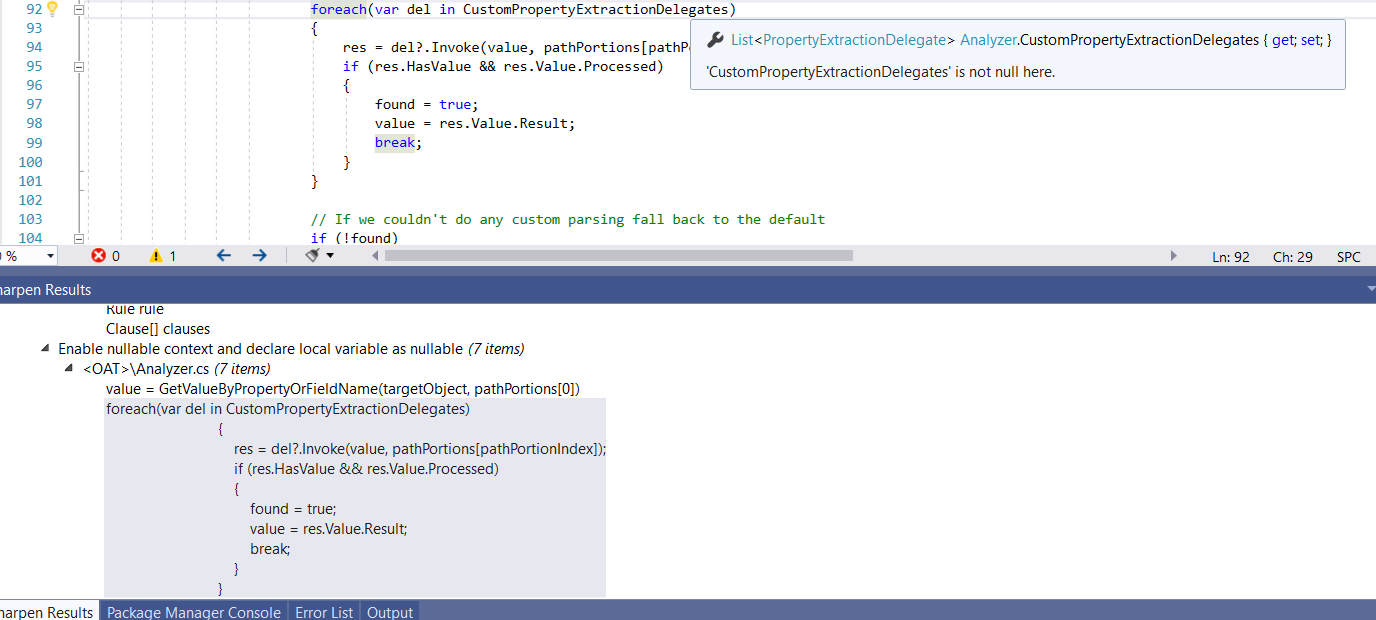-
Notifications
You must be signed in to change notification settings - Fork 32
New issue
Have a question about this project? Sign up for a free GitHub account to open an issue and contact its maintainers and the community.
By clicking “Sign up for GitHub”, you agree to our terms of service and privacy statement. We’ll occasionally send you account related emails.
Already on GitHub? Sign in to your account
False positives in c# 8 nullable reference suggestions #38
Comments
|
@gfs thank you so much for putting effort into assembling such a detailed list! Shame on me, all of the reported issues are well known and documented already, more than a year ago :-( If you take a look at the EnableNullableContextAndDeclareIdentifierAsNullableAnalyzer.cs (dated June 18th, 2019) you will see these comments inside: At the time I was implementing that first version nullable reference types were still a work in progress, as some like some other C# features. My focus was on getting the feature ready to the level where it clearly shows how many places we have in our real-life code that will benefit from the features. When I say ready, it means ready for the conferences and talks I was giving. I didn't expect that time that there will be such a huge gap in the Sharpen's development :-( For the record, writing the proper VS2019 implementation for Thanks once again a lot for pointing the issues. Your examples clearly show that now, a year after, the TODOs left in code pose serious issues. The fix will be part of the next release. |
|
Thanks for your detailed response and I look forward to the update! |
I'm seeing a lot of C# 8 Nullable Reference Type issues.
Issue 1
These issues remind me to turn on nullable context, which is already enabled project wide in the csproj.
Issue 2
See Example 1 for a constructor issue, declaring a property as nullable in an API indicates you intend for the consumer to pass nulls. In this case we don't (and throw exceptions).
Issue 3
See example 2, There's no way to declare a var as nullable and the target of the foreach is non-null.
Issue 4
See example 3, There's no way to declare a var as nullable.
Code snippets are from OAT which triggers many of the same types of issues: https://github.com/microsoft/OAT
For context, I do have nullable reference types enabled project wide.
Example 1
This code triggers "Enable Nullable Context and declare constructor parameters as nullable. I explicitly don't want nulls passed in, but am already handling nulls. Setting these parameters to be nullable would indicate to consumers that they may expect reasonable behavior if they pass in nulls. This is explicitly an API you may not pass nulls to.
Example 2
This is a false positive. The target is both not null and there's no way to declare a "var" as nullable.

Example 3
This is another false positive. There's no way to declare a var as nullable. It's fine that this is may be null here.
The text was updated successfully, but these errors were encountered: